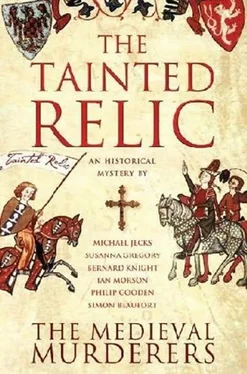Michael was unwilling to dismiss the case so soon. ‘What do you think of Tomas? He seems to crop up with suspicious regularity in this case-he quells public quarrels between Witney and the ex-thatcher; he knows a good deal of blood relic theology, Witney’s favourite subject; however, we are told that his knowledge of angels-Seton’s speciality-is lacking.’
‘I do not see why Tomas should be involved in Witney’s death, Brother. He is intelligent, but not so obsessed with his studies that he cannot laugh, unlike most of these clerics. I am looking forward to knowing him better.’
Michael pursed his lips. ‘You have just warned me against allowing amiability to colour my judgement, and now you are falling into the same trap. However, I think there is something unsettling about Tomas. He is a Dominican, whose Order believes blood relics should not be revered, just as the Franciscans propose they should be accorded the greatest respect.’
‘You have uncovered one or two odd facts about him, and you are determined to see him guilty of some crime. As I have told you-twice-I do not think there was a crime. And nor do I think Tomas had anything to do with Witney’s death.’
‘How can you be sure?’
‘Because he has an alibi: he was in the Dominican priory when Witney died-and you and I were with him.’
‘So we were,’ acknowledged Michael with poor grace. ‘However, just because he did not physically scramble on the roof, hurling masonry atop the heads of rival Franciscans, does not mean he did not hire someone else to do it.’ He was thoughtful for a moment. ‘Did you say the argument he quelled between Witney and his namesake was about thatching?’
Bartholomew nodded. ‘Big Thomas was a thatcher before he took the cowl.’
Michael’s eyed gleamed. ‘A thatcher is an expert on roofs . And Witney was killed when something dropped from a roof . I wonder whether that is significant.’
‘It is not,’ said Bartholomew firmly. ‘It is far too tenuous a connection.’
Michael sighed. ‘We will get nowhere with this tonight, so we should put it from our minds and see whether there is anything for supper. I am ravenous.’
Bartholomew stared at him. ‘You ate enough at the Dominican priory to last most men a week.’
‘I am not most men, Matt,’ replied Michael comfortably. ‘I am different. And that is why I shall prod about this peculiar death until I have answers.’
The next day, Bartholomew spent the morning teaching, then went with two of his senior students to visit a patient in the Carmelite friary. The victim was the prior, William de Lincolne, a large man with an oddly brushed tuft of hair that rose vertically from his forehead. He had been confined to his bed since the onset of an ague, and was more than willing to pass the time of day in idle chatter with his physician. Bartholomew found it hard to extricate himself, and it was some time before he escaped to his other duties.
It was another scorching day, and he sweltered under his woollen tabard. He longed to pull it off, but the university had decreed that all college scholars should wear liveries that were immediately identifiable, and he did not want to set a bad example to his students.
He was not the only one overheating. He was just walking past St Botolph’s Church on the High Street when he saw a familiar figure. It was Father Andrew, sitting disconsolately on the wall that surrounded the graveyard, mopping his forehead with the sleeve of his habit.
‘Can I fetch you some watered ale, Father?’ asked Bartholomew solicitously, knowing that hot weather could take its toll on the elderly.
Andrew shook his head. ‘It is not the heat that ails me-I have known far fiercer suns in the past. Ten years after I took holy orders, my prior dispatched me on a long, arduous mission in the lands of the Bohemians and Magyars.’
‘Really?’ asked Bartholomew, intrigued. It was unusual to meet men who had journeyed to such exotic places. ‘That must have been interesting.’
Andrew smiled. ‘It was a stimulating interlude in my life. It allowed me to visit distant universities, and I was appointed as a law-keeper in one, a post rather like Brother Michael’s. But I never really settled, and was glad to return to the peaceful Devonshire hills once my mission was completed.’
‘What was your mission? To search for relics?’
Andrew grimaced. ‘I was a minor political envoy, but Prior William’s real purpose in sending me away was to cure me of what he perceived to be a dangerous obsession with my relic. However, during my absence, that prior departed and another replaced him. Master Hugh and his successors did not try to “cure” me; they left me to my own devices-until John de Burgo was elected, that is.’
‘I see,’ said Bartholomew. He was more interested in the man’s journeys than in what had happened when he returned; even the name of the kingdoms of the east brought back memories of his own travels. ‘How far did you go?’
But Andrew did not share his enthusiasm. ‘Too far, and I was glad to be home.’ He sighed, and wiped his head again.
‘What ails you, if not the heat?’ asked Bartholomew. ‘Can I help?’
Andrew indicated Bartholomew’s bored medical students, who waited at a discreet distance. ‘I have nothing a physician can cure, and your boys are restless. Do not linger here, wasting time with old men, when you could be instructing them in the ways of virtue and goodness.’
‘I teach them medicine. Goodness and virtue I leave to the priests.’
‘You should take more care of them,’ recommended Andrew. ‘If you do not temper their learning with the teachings of the Church, they will make their own interpretations of what you tell them, and they will hurt you with betrayals.’
Bartholomew helped him to his feet and watched him hobble away, puzzled by the advice. His students immediately began a barrage of questions about the effects of the heat on elderly humours, and he was absorbed in answering them until one, Deynman, gave a yelp and raised his hand to his head. It came away bloody.
‘A stone!’ he cried indignantly, pointing across the road. ‘He threw a stone!’
‘Who?’ asked Bartholomew. He could see no one.
‘Kip Roughe,’ shouted Deynman. ‘He is the Dominicans’ servant, and is always jibing us because we are not theologians. He hurled the rock: I saw him.’
‘Why would he do that?’ asked Bartholomew, leading him to the churchyard wall. The student was pale, and he did not want him to faint.
‘He is just plain nasty,’ replied Deynman, tilting his head so Bartholomew could inspect it. The wound was not serious, although, like many scalp injuries, it bled profusely. ‘He has no reason to lob missiles at me. I have never even spoken to him, although I know who he is-everyone does, because he is a lout.’
‘He even brawls with students from his own institution,’ added his friend. ‘Poor Bulmer has a sore face from one of his punches.’
Bartholomew recalled Bulmer’s jaw-a nasty bruise that would make eating painful for weeks to come. He gave Deynman a clean dressing to hold to the cut and sent him home. He warned him not to retaliate to Roughe’s assault, knowing how quickly such situations could escalate, and watched until he was out of sight. Then he marched towards St Botolph’s Church and stamped inside.
The interior was cool and dark after the brilliance outside, and it took a moment for his eyes to become accustomed to the gloom. Then he saw two shadows easing silently along the south aisle, aiming for the priest’s door in the chancel. He broke into a run and had Kip Roughe by the scruff of his neck before he could reach it. Kip was a burly fellow, with the kind of battered face that indicated he enjoyed a brawl, while his brother John was larger. It occurred to Bartholomew that it was unwise to tackle them when they could easily overpower him, but the grabbing was done and he knew it would be a mistake to reveal his unease.
Читать дальше












